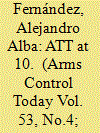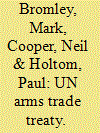| Srl | Item |
| 1 |
ID:
190340


|
|
|
|
|
| Summary/Abstract |
Ten years ago, the Arms Trade Treaty (ATT) was adopted by the UN General Assembly with the promise to establish common standards for the international trade in conventional arms in order to reduce the terrible human consequences caused by the illegal, irresponsible transfers of these weapons.
|
|
|
|
|
|
|
|
|
|
|
|
|
|
|
|
| 2 |
ID:
119011


|
|
|
| 3 |
ID:
107388


|
|
|
|
|
| Publication |
2011.
|
| Summary/Abstract |
Representatives of UN member states came away from a July 11-15 meeting in New York with a statement of support from the five permanent members of the Security Council (P5) for the arms trade treaty (ATT) negotiation process and the first full but controversial and unofficial text of what a treaty might look like.
|
|
|
|
|
|
|
|
|
|
|
|
|
|
|
|
| 4 |
ID:
115280


|
|
|
|
|
| Publication |
2012.
|
| Summary/Abstract |
The UN conference to negotiate an Arms Trade Treaty (ATT) concluded on 27 July 2012 without reaching consensus on the text of a draft treaty and saw both the US and Russia calling for more time to negotiate. The ATT process marks the latest in a series of attempts to insert human security concerns into arms export controls. The setback in July raises questions about the current level of international support for the human security agenda, as well as the relative power of different actors to shape global governance structures. This article locates the ATT negotiations in the broader history of multilateral efforts to regulate the international arms trade, from the 1890 Brussels Act to post-Cold War initiatives. The historical record shows that such efforts are more likely to succeed if they are negotiated or imposed by major arms exporters. The introduction of human security concerns, as well as the merging of export control and arms control agendas, went some way towards reversing this trend. In particular, it created a broad international coalition of supportive states and NGOs from the global North and South. Yet disagreements over the purpose of an ATT remained. The draft ATT included human security provisions, but China, Russia, the US and a number of emerging powers ensured that state security considerations remained paramount in decision-making on arms exports. The US was the first major actor to announce its unwillingness to sign the draft ATT in July 2012 and two alternative interpretations of US actions are considered. The article concludes by considering the options available to supporters of the ATT process following the 2012 conference and examines the notion that the ATT campaign has become an initiative 'out of its time', one that might have had success in the 1990s but not in current circumstances.
|
|
|
|
|
|
|
|
|
|
|
|
|
|
|
|